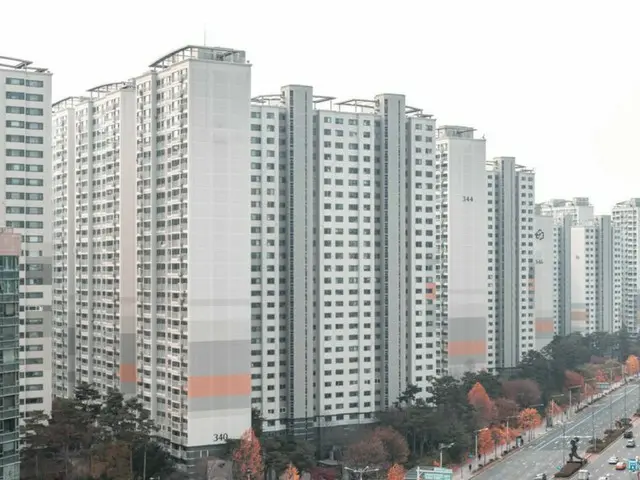The housing penetration rate has fallen to 90%, below 100% nationwide. In the current situation of a housing supply shortage, some have suggested that it is necessary to raise the barriers to housing purchases for foreigners.
According to the court registration information on the 27th regarding the current status of applications for transfer of ownership of real estate (buildings, land, etc.), the number of real estate purchased by foreigners in Korea in 2024 will be 27,079, down from the total (35.
From January to April this year, 7,963 properties were purchased, accounting for 0.7% of the total (1,134,088 properties). Until 2021, the figure was at 0.5%.
However, the trend is still on the rise. If we limit it to apartment buildings such as condominiums, the percentage will be even higher. The number of apartment transactions by foreigners is expected to be 16,140 in 2024, down from the total (1
In April of this year, 4,935 units were purchased, accounting for 1% of the total (476,438 units). This percentage is rapidly declining from 0.7% in 2021.
The number of apartment complexes purchased by foreigners is increasing. Two-thirds of these purchases are concentrated in the capital area. The cumulative percentage for April this year was 74.5%. The area where foreigners have made the most purchases is Bupyeong-dong, Incheon.
It was found that Bupyeong-gu, Incheon, was the area where the most foreigners purchased homes among all cities, districts and towns nationwide for the fourth consecutive year from 2021 to 2024.
Danwon-gu, Ansan-si, came in second for the second consecutive year. The percentage of foreigners purchasing homes in Seoul is expected to be 16.1% in 2024 and 16.7% this year.
This is a decrease from 2021 (20.2%), when housing prices were soaring. It is analyzed that the rapid rise in housing prices in Seoul has raised the barriers to purchase.
By nationality, Chinese buyers accounted for 60% of the total. Chinese buyers are expected to purchase more than 10,000 apartment buildings in 2024, accounting for 63.5% of the total, followed by Americans and Canadians.
The top three countries accounted for 83.4% of the total. As of April this year, Chinese purchases accounted for 61.5% of the total.
Americans and Canadians are emerging as leaders in the residential rental market, including officetels.
According to the Real Estate Ownership Preservation Registry, the number of multi-family building registrations by foreigners in 2024 will be 224, accounting for 0.04% of the total (590,951), down from 2021 (0.12%).
However, Americans and Chinese nationals were the most numerous with 90 registrations each. Canadians recorded the most registrations in 2021 and 2023 with 534 and 126 registrations, respectively.
Normally, preservation registration is a procedure for registering the first ownership of unregistered real estate, but considering that such preservation registration is often concentrated in certain areas such as Gyeonggi-do,
Considering this, it is analyzed that overseas real estate developers build officetels and other multi-use buildings in Korea and then register them before renting them out. This is why the annual deviation is so large.
Demand from foreigners is generally increasing in both the housing market and the rental market. In particular, the proportion of foreigners in the housing market is increasing, and the actual housing penetration rate is even lower than the actual statistics.
It has been pointed out that the housing penetration rate, calculated by dividing the number of ordinary households by the total number of houses as a result of the Population and Housing Census, is 102.5% as of 2023. However, the overall number of households is 2.
If foreign households, which account for 8% (637,218 households), are included, the housing penetration rate drops to 99.6%, indicating a housing shortage.
The housing penetration rate in the Seoul area will fall from 97.2% to 93.6%, and in particular Seoul will fall from 93.6% to 90.3%. Officetels are not included in the number of housing units, but if officetels are included, the number of residential units will be
The penetration rate of officetels is expected to increase, but there are no accurate statistics on the number of officetel households.
In particular, foreigners are not subject to domestic regulations in Korea regarding loans, taxes, etc., and are not subject to the same treatment as Koreans.
"In Seoul and other areas where there is already a housing shortage, the demand from foreigners is increasing, and the number of homes available to Korean residents is also declining," said Kim Do-rae, head of the Korea Housing Industry Research Institute.
"There is a risk that this could affect home buyers," he said, adding, "We need to discuss what measures should be taken in certain areas that are of interest to foreigners." He added, "International norms do not allow foreigners to live in certain areas, so we must consider how to deal with this."
"We should not be discriminatory, but in a situation where the international order is collapsing, we need to think about ways to differentiate in areas where demand for foreigners is concentrated," he said.
"By taking measures such as increasing stamp duty when buying a home, the actual purchase price is made higher," he added.
According to the LH Land and Housing Research Institute, foreigners are looking for housing in Australia.
When selling real estate, foreigners must pay capital gains tax 7% to 8% higher than domestic citizens. Canada will temporarily ban non-Canadians from purchasing residential real estate for two years from 2023.
The government decided to impose a 10% tax on foreigners who buy more than one home, but has now extended this until 2027. Singapore imposes an additional stamp duty on foreigners who buy more than one home.
2025/05/28 07:17 KST
Copyrights(C) Edaily wowkorea.jp 107

